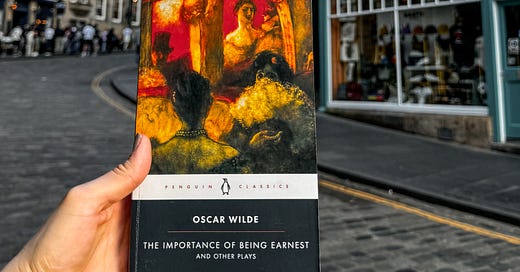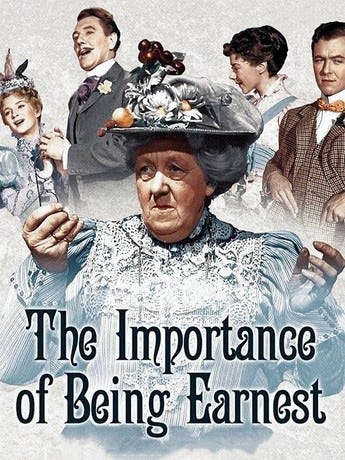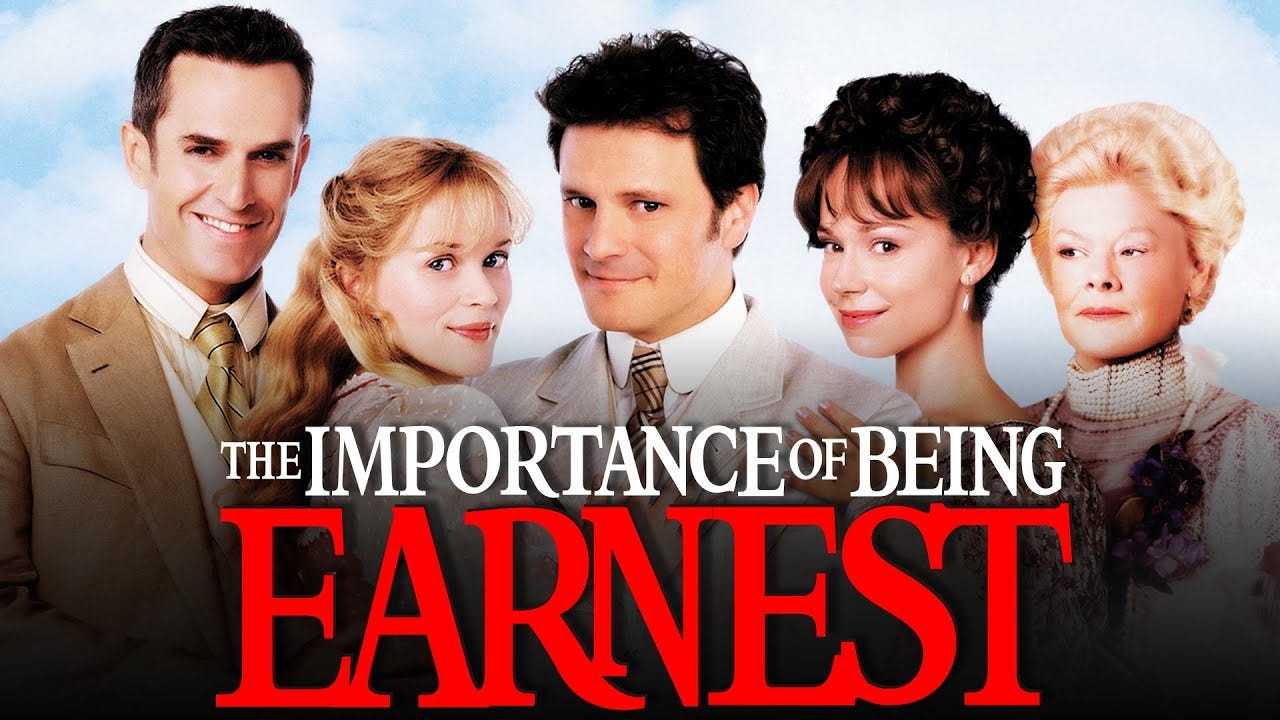I was listening to one of my favorite podcasts, ‘Hardcore Literature’ by Benjamin McEvoy when I learned about The Importance of Being Earnest. I decided to read the play as soon as I finished the episode. It took me months to finally get to it, though!
Eventually, I read the book, which consists of six plays: Lady Windermere's Fan (I wrote about that before), Salomé, A Woman of No Importance, An Ideal Husband, A Florentine Tragedy, and The Importance of Being Earnest.
The plays follow a similar concept: illustrating the absurdity of social conventions with Wilde's signature wit. Except for Salomé and A Florentine Tragedy, which have different storylines, the other four plays focus on the lives of upper-class Victorian English people, mocking their lifestyles and beliefs. To be fair, I couldn’t enjoy Salomé and A Florentine Tragedy, but the other plays were great!
At the heart of the play are two friends, Algernon Moncrieff and Jack Worthing, both of whom lead double lives to escape the constraints of their rigid social circles. Algernon fabricates an invalid friend, "Bunbury," to excuse himself from tedious social obligations, while Jack adopts the name "Ernest" to enjoy a life of carefree bachelorhood in the city. This elaborate deception spirals out of control when both men fall in love—Algernon with Jack’s ward, Cecily, and Jack with Gwendolen, Algernon’s cousin—neither of whom would settle for anyone whose name isn’t “Ernest.”
Playing with the name "Ernest" and the word "earnest" in the title is genius which works in two ways:
1. Seriousness and Earnestness: The name itself means "serious". This irony is central to the play, as both Jack and Algernon use the name "Ernest" as a facade to hide their true identities and avoid their responsibilities.
2. The Importance of Appearances: The play satirizes the Victorian obsession with appearances and social status. The name "Ernest" represents a traditional, respectable, and serious image that both Jack and Algernon strive to maintain, even though they are far from earnest in their actions.
By using the name "Ernest" as a central theme, Wilde highlights the superficiality of Victorian society and the emphasis on appearances over genuine character. The play's title, The Importance of Being Earnest, is a clever play on words, suggesting that while earnestness may be valued, it is ultimately less important than the appearance of being earnest. This is evident in the dialogue between Gwendolen and Jack, and Cecily and Algernon:
GWENDOLEN: We live, as I hope you know, Mr. Worthing, in an age of ideals. The fact is constantly mentioned in the more expensive monthly magazines and has reached the provincial pulpits, I am told; and my ideal has always been to love someone of the name of Ernest. There is something in that name that inspires absolute confidence. The moment Algernon first mentioned to me that he had a friend called Ernest, I knew I was destined to love you.
CECILY: There is something in that name that seems to inspire absolute confidence. I pity any poor married woman whose husband is not called Ernest.
Wilde's razor-sharp wit and sparkling dialogue are on full display in The Importance of Being Earnest. The characters are delightfully shallow and self-absorbed, yet their antics are so absurdly entertaining that it's impossible not to be amused.
GWENDOLEN: I never travel without my diary. One should always have something sensational to read on the train.
The transformation of Algernon was particularly interesting to me. At the beginning of the play, Wilde leads us to believe he is against marriage, but later on, we find him in love and proposing to Cecily:
ALGERNON: I really don't see anything romantic in proposing. It is very romantic to be in love. But there is nothing romantic about a definite proposal. Why, one may be accepted. One usually is, I believe. Then the excitement is all over. The very essence of romance is uncertainty. If ever I get married, I'll certainly try to forget the fact.
The play’s exploration of the superficiality of Victorian society is both clever and insightful, as Wilde highlights the importance of appearances and social status over genuine character. Lady Bracknell, as the representative of this society, exemplifies this absurdity perfectly.
One of the play’s most memorable moments is the "Bunburyist" philosophy, which Algernon espouses. "Bunburying" refers to the practice of inventing a fictitious invalid relative to escape one’s social obligations. Wilde uses this concept to satirize the lengths to which people go to avoid their responsibilities and pursue their own desires.
The Importance of Being Earnest is a truly delightful comedy that has stood the test of time. Its witty dialogue, clever characters, and timeless themes make it a must-read for anyone who appreciates classic literature. Whether you're a fan of Wilde’s work or simply looking for a hilarious and thought-provoking play, The Importance of Being Earnest is sure to entertain and delight.
A Funny Side Note 😅:
A funny coincidence happened when I read these lines and, ten minutes later, heard a woman on TV repeating them. It felt like my mind was using cookies to enhance my reading experience!
ALGERNON: All women become like their mothers. That is their tragedy. No man does. That's his.
Movie Adaptations of The Importance of Being Earnest
While Oscar Wilde's The Importance of Being Earnest has been adapted for the screen several times, these adaptations have not always been as successful as the original play. The play's intricate dialogue, witty humor, and sophisticated characters like most of the plays, can be challenging to translate to film, which often requires a more visual and fast-paced approach.
Here are a few notable film adaptations of The Importance of Being Earnest:
The Importance of Being Earnest (1952): This early adaptation stars Michael Redgrave as Jack Worthing and Joan Greenwood as Gwendolen Fairfax. While the film is faithful to the original play, it has been criticized for its slow pacing and lack of visual flair.
The Importance of Being Earnest (2002): This modern adaptation stars Colin Firth as Jack Worthing, Reese Witherspoon as Cecily Cardew, and Judi Dench as Lady Bracknell. The film is set in the 1920s and features a more contemporary take on the story. Despite its stylish production values, the film has been criticized for its lack of comedic spark.
I haven’t watched any of the movie adaptations, but I'm looking forward to seeing this play in a theater one day!
Have you read this play or any of Wilde's other works?
Thanks for reading☺️ If you liked this review, press ❤️ and share it with your friends!







